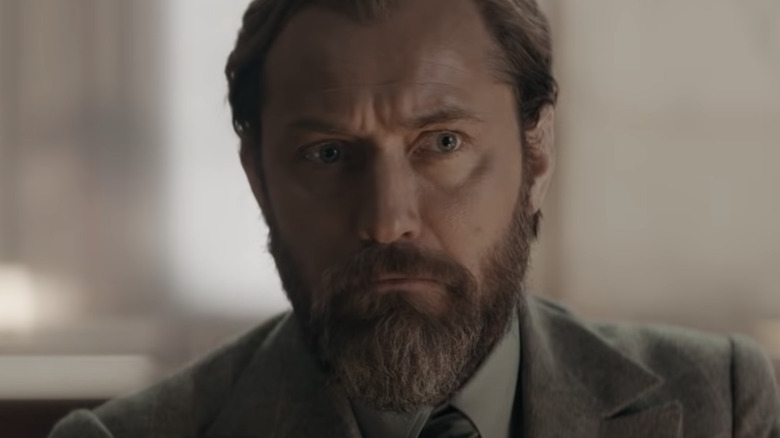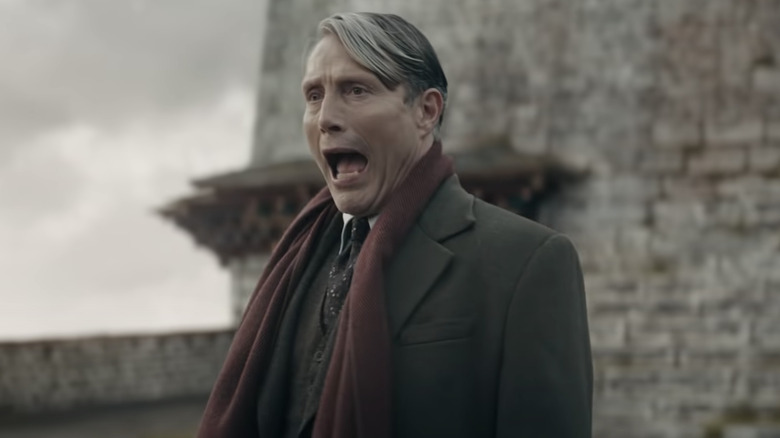It's Time To Talk About That Dumbledore And Grindelwald Scene In Fantastic Beasts 3
Audiences first truly meet Gellert Grindelwald in 2016's "Fantastic Beasts and Where to Find Them," though any Potterhead should be familiar with the dark wizard as a major part of Albus Dumbledore's (Jude Law) backstory in "Harry Potter." Grindelwald is first introduced briefly in "Harry Potter and the Sorcerer's Stone" as Dumbledore's greatest pre-Voldemort foe. In the newest Wizarding World movie, "Fantastic Beasts: The Secrets of Dumbledore," the two powerful wizards finally share significant screen time, and the long-fated collision of good and evil in the Wizarding World doesn't disappoint. The two characters meet face-to-face more than once to debate Grindelwald's (Mads Mikkelsen) plan to turn the wizarding community against the non-magical world, but their differences aren't ultimately settled with words.
By the new film's end, Dumbledore, Newt (Eddie Redmayne), and their associates expose Grindelwald's manipulation of the International Confederation of Wizards and successfully break the blood pact between the two men that prevents them from fighting directly. Both Albus and Aberforth Dumbledore (Richard Coyle) cast spells to protect Credence (Ezra Miller) from Grindelwald's killing curse, breaking through the magical prohibition restraining Dumbledore up to this point. In the ensuing — but brief — duel, Albus successfully fends off Grindelwald, who manages to escape from Bhutan.
The climactic battle is satisfying, but the most interesting part of "The Secrets of Dumbledore" isn't this fight; rather, it's the on-screen culmination of J.K. Rowling's two-decade project to reframe fans' understanding of the two characters.
Fantastic Beasts 3 finally makes Dumbledore and Grindelwald's romantic relationship canon
In 2007, Rowling surprised "Harry Potter" fans when she first confirmed that Dumbledore was gay (via ABC News). This information has long since informed how fans view the character's relationship with Grindelwald, initially depicted in "Harry Potter and the Deathly Hallows" as a brief but close friendship between two brilliant young wizards who wanted to unite the Deathly Hallows and cheat death. By now, the rest of the story feels like classic wizarding history. As Grindelwald's ideations grew darker, Dumbledore recanted his position, leading to a three-way duel between the gifted wizards and Aberforth that caused the death of the youngest Dumbledore sibling, Ariana, thus fracturing Albus and Grindelwald's relationship for good.
In "The Secrets of Dumbledore," Albus tells Grindelwald directly that he once loved him and later openly refers to their relationship as "the summer Gellert and I fell in love" in conversation with Newt and Theseus Scamander (Callum Turner). "Harry Potter and the Deathly Hallows" makes it seem that Dumbledore kept his affiliation with Grindelwald a secret in later years, so to have the character openly speaking about it with his peers in the new movie should serve as a bit of fresh air for fans searching for more direct LGBTQ+ representation in the franchise. For many, Rowling's post-hoc retcon of Dumbledore's sexuality always felt like a bit of a cop out. As a result, this moment from "The Secrets of Dumbledore" accrues added weight.

